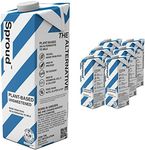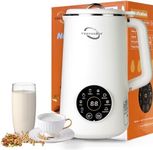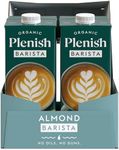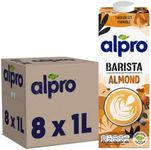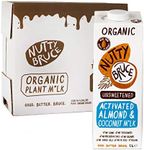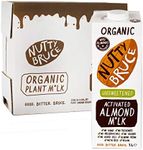Buying Guide for the Best Almond Milks
Choosing the right almond milk can enhance your dietary experience, whether you're using it for drinking, cooking, or adding to your coffee. Almond milk is a popular plant-based alternative to dairy milk, known for its nutty flavor and lower calorie content. When selecting almond milk, consider your dietary needs, taste preferences, and how you plan to use it. Understanding the key specifications can help you make an informed decision that aligns with your lifestyle and nutritional goals.Sweetened vs. UnsweetenedThis specification refers to whether the almond milk has added sugars or not. Sweetened almond milk often contains added sugars to enhance flavor, making it taste sweeter. Unsweetened almond milk, on the other hand, has no added sugars and is typically lower in calories. If you're watching your sugar intake or prefer a more natural taste, unsweetened almond milk might be the better choice. However, if you enjoy a sweeter taste or plan to use it in desserts, sweetened almond milk could be more suitable.
FlavorAlmond milk comes in various flavors, such as vanilla, chocolate, or plain. The flavor can significantly impact your enjoyment of the milk, especially if you're drinking it on its own or adding it to beverages. Plain almond milk has a subtle nutty taste, while flavored options like vanilla or chocolate can add a sweet twist. Consider how you plan to use the almond milk; for example, plain might be best for cooking, while flavored could be more enjoyable in coffee or as a standalone drink.
FortificationFortification refers to the addition of vitamins and minerals to almond milk, such as calcium, vitamin D, and vitamin B12. These nutrients are often added to make almond milk more comparable to dairy milk in terms of nutritional value. If you're using almond milk as a primary milk substitute, especially if you're vegan or lactose intolerant, choosing a fortified option can help ensure you're getting essential nutrients that might otherwise be lacking in your diet.
ConsistencyThe consistency of almond milk can vary from thin and watery to thick and creamy. This is important depending on how you plan to use the milk. Thinner almond milk might be preferable for drinking or adding to cereal, while a thicker consistency could be better for coffee or cooking, where a creamier texture is desired. Consider your personal preference and the intended use when selecting the consistency that suits you best.
Organic vs. Non-OrganicOrganic almond milk is made from almonds that are grown without synthetic pesticides or fertilizers. Choosing organic can be important if you are concerned about the environmental impact of farming practices or potential pesticide residues. Non-organic almond milk may be more affordable and still offer the same basic nutritional benefits. Decide based on your personal values and priorities regarding organic products.
Shelf LifeShelf life refers to how long the almond milk can be stored before it spoils. Some almond milks are shelf-stable and can be stored at room temperature until opened, while others require refrigeration. If you have limited refrigerator space or want to stock up, shelf-stable options might be more convenient. However, if you prefer fresher taste and plan to consume it quickly, refrigerated almond milk could be the way to go.


